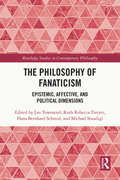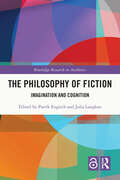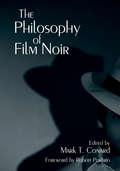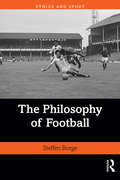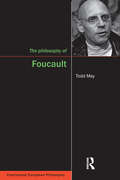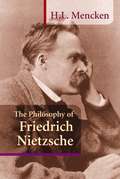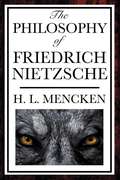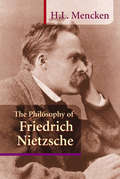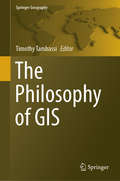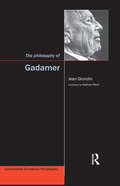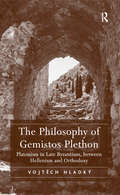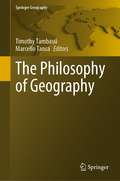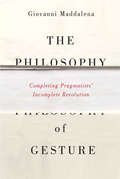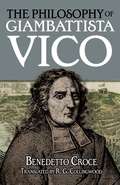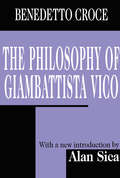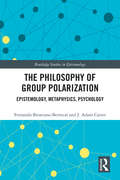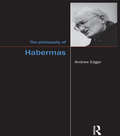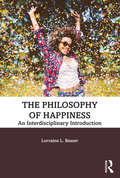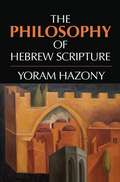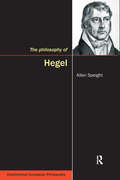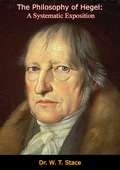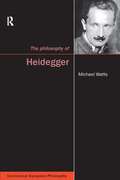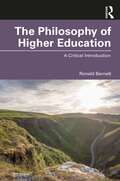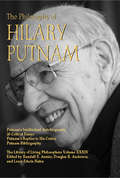- Table View
- List View
The Philosophy of Fanaticism: Epistemic, Affective, and Political Dimensions (Routledge Studies in Contemporary Philosophy)
by Leo TownsendThe essays in this volume explore some of the disconcerting realities of fanaticism, by analyzing its unique dynamics, and considering how it can be productively confronted. The book features both analytic and continental philosophical approaches to fanaticism. Working at the intersections of epistemology, philosophy of emotions, political philosophy, and philosophy of religion, the contributors address a range of questions related to this increasingly relevant, yet widely neglected topic. What are the distinctive features of fanaticism? What are its causes, motivations, and reasons? In what ways, if at all, is fanaticism epistemically, ethically, and politically problematic? And how can fanaticism be combatted or curtailed? The Philosophy of Fanaticism will be of interest to scholars and advanced students working in epistemology, philosophy of religion, philosophy of emotions, moral psychology, and political philosophy.
The Philosophy of Fiction: Imagination and Cognition (Routledge Research in Aesthetics)
by Patrik Engisch Julia LangkauThis book presents new research on the crucial role that imagination plays in contemporary philosophy of fiction. The first part of the book challenges the main paradigm set by Kendall Walton and Gregory Currie, according to which there is a necessary connection between fiction and a prescription that we engage imaginatively with its content. The contributors address the fundamental questions of how we can define fiction, and especially whether we can define fiction in terms of imagination. The second part focuses on a distinct but related question: can we point to some distinctive experiential features of our engagement with fiction? In the third part, the focus lies on the cognitive value of fiction and on the role that imagination plays in that respect. The chapters in this part discuss the cognitive value of fiction with respect to issues such as the training of the faculty of imagination, phenomenal experience, empathy, and the emotions. The Philosophy of Fiction will be of interest to scholars and advanced students working in aesthetics, philosophy of mind, epistemology, and literary studies. Chapter 13 of this book is available for free in PDF format as Open Access from the individual product page at www.routledge.com. It has been made available under a Creative Commons Attribution-Non Commercial-No Derivatives 4.0 license.
The Philosophy of Film Noir (The Philosophy of Popular Culture #Ppcs)
by Mark T. ConardAn essay collection examining the philosophical elements of select films in noir cinema, as well as the genre’s legacy in film and culture.A drifter with no name and no past, driven purely by desire, is convinced by a beautiful woman to murder her husband. A hard-drinking detective down on his luck becomes involved with a gang of criminals in pursuit of a priceless artifact. The stories are at once romantic, pessimistic, filled with anxiety and a sense of alienation, and they define the essence of film noir. Noir emerged as a prominent American film genre in the early 1940s, distinguishable by its use of unusual lighting, sinister plots, mysterious characters, and dark themes. From The Maltese Falcon (1941) to Touch of Evil (1958), films from this classic period reflect an atmosphere of corruption and social decay that attracted such accomplished directors as John Huston, Alfred Hitchcock, Billy Wilder, and Orson Welles.The Philosophy of Film Noir is the first volume to focus exclusively on the philosophical underpinnings of these iconic films. Drawing on the work of diverse thinkers, from the French existentialist Albert Camus to the Frankurt school theorists Max Horkheimer and Theodor Adorno, the volume connects film noir to the philosophical questions of a modern, often nihilistic, world. Opening with an examination of what constitutes noir cinema, the book interprets the philosophical elements consistently present in the films—themes such as moral ambiguity, reason versus passion, and pessimism. The contributors to the volume also argue that the essence and elements of noir have fundamentally influenced movies outside of the traditional noir period. Neo-noir films such as Pulp Fiction (1994), Fight Club (1999), and Memento (2000) have reintroduced the genre to a contemporary audience. As they assess the concepts present in individual films, the contributors also illuminate and explore the philosophical themes that surface in popular culture.A close examination of one of the most significant artistic movements of the twentieth century, The Philosophy of Film Noir reinvigorates an intellectual discussion at the intersection of popular culture and philosophy.Praise for The Philosophy of Film Noir“The essays work both as solid primers into philosophy, stretching from Aristotle to Schopenhauer, and as lucid excursions into the genre’s dark, mean streets. . . . A fascinating, readable, and provocative book. . . . Highly recommended.” —Choice“Dense and intriguing, the book suggests noir is best perceived as a slightly warped mirror held up to contemporary society.” —Publishers Weekly
The Philosophy of Football (Ethics and Sport)
by Steffen BorgeHuman beings are the only creatures known to engage in sport. We are sporting animals, and our favourite pastime of football is the biggest sport spectacle on earth. The Philosophy of Football presents the first sustained, in-depth philosophical investigation of the phenomenon of football. In explaining the complex nature of football, the book draws on literature in sociology, history, psychology and beyond, offering real-life examples of footballing actions alongside illuminating thought experiments. The book is organized around four main themes considering the character, nature, analysis and aesthetics of football. It discusses football as an extra-ordinary, unnecessary, rule-based, competitive, skill-based physical activity, articulated as a social (as opposed to natural) kind that is fictional in character, and where fairness or fair play – contrary to much sport ethical discussion – is not centre stage. Football, it is argued, is a constructive- destructive contact sport and, in comparison to other sports, is lower scoring and more affected by chance. The latter presents to its spectators a more unpredictable game and a darker, more complex and denser drama to enjoy. The Philosophy of Football deepens our understanding of the familiar features of the game, offering novel interpretations on what football is, how and why we play it, and what the game offers its followers that makes us so eagerly await match day. This is essential reading for anybody with an interest in the world’s most popular game or in the philosophical or social study of sport.
The Philosophy of Foucault (Continental European Philosophy Ser. #8)
by Todd MayMichel Foucault's historical and philosophical investigations have gone through many phases: the archaeological, the genealogical, and the ethical among them. What remains constant, however, is the question that motivates them: who are we? Todd May follows Foucault's itinerary from his early history of madness to his posthumously published College de France lectures and shows how the question of who we are shifts and changes but remains constantly at or just below the surface of his writings. By approaching Foucault's work in this way, May is able to offer readers an engaging and illuminating way to understand Foucault. Each of Foucault's key works - "Madness and Civilization," "The Archaeology of Knowledge," "The Order of Things," "Discipline and Punish" and the multi-volume "History of Sexuality" - are examined in detail and situated in an historical context that makes effective use of comparisons with other thinkers such as Freud, Nietzsche and Sartre. Throughout this book May strikes a balance between sympathetic presentation and criticism of Foucault's ideas and in so doing exposes Foucault's contributions of lasting value. "The Philosophy of Foucault" is an accessible and stimulating introduction to one of the most popular and influential thinkers of recent years and will be welcomed by students studying Foucault as part of politics, sociology, history and philosophy courses.
The Philosophy of Friedrich Nietzsche
by H. L. MenckenFirst published in 1908, this book, one of Mencken's earliest and the first book on Nietzsche to appear in English, consists of a brief biographical sketch followed by explanations of Nietzsche's basic concepts and attitudes. This edition contains explanatory notes and a new introduction on the similarities between Nietzsche and Mencken and the reasons that Nietzsche is so often misinterpreted.
The Philosophy of Friedrich Nietzsche
by H. L. MenckenThe book covers both wider and lesser known areas of Friedrich Nietzsche's life and philosophy, notable both for its suggestion of Mencken's still-developing literary talents at the age of 27 and for its impressive detail as a book written in the United States (on only the seventh year of Nietzsche's death) considering the lack of reliable interpretations of Nietzsche in the American sphere of letters at the time; Mencken prepared for writing this book by reading all of Nietzsche's published philosophy, including several works in the original German.
The Philosophy of Friedrich Nietzsche
by H. L. MenckenThe first book on Nietzsche ever to appear in English, this examination by legendary journalist H. L. Mencken is still one of the most enlightening. Mencken wrote this book while still in his 20s, but his penchant for thoroughness was evident even at that young age--in preparation for writing this book, he read Nietzsche's works in their entirety, mostly in the original German. A brief biographical sketch is followed by clear and thorough explanations of Nietzsche's basic concepts and attitudes. Analyzed are Nietzsche's much-misunderstood concept of the superman, his concept of eternal recurrence, his rejection of Christianity, and his basic rationalism and materialism. Included are two essays on Nietzsche that appeared in Mencken's magazine The Smart Set subsequent to the publishing of the original edition of this book. Nearly a century after its original publication, this remains one of the clearest, most concise, and entertaining introductions to Nietzsche to date.
The Philosophy of GIS (Springer Geography)
by Timothy TambassiThis anthology aims to present the fundamental philosophical issues and tools required by the reflection within and upon geography and Geographic Information Systems (GIS) . It is an introduction to the philosophy for GIScience from an analytical perspective, which looks at GIS with a specific focus on its fundamental and most general concepts and distinctions. The first part of the book is devoted to explore some of the main philosophical questions arising from GIS and GIScience, which include, among others, investigations in ontology, epistemology, linguistics and geometrical modeling. The second part concerns issues related to spatial and cartographical representations of the geographical world. The third part is focused on the ontology of geography, specifically in terms of geographical entities, objects and boundaries. Finally, in the fourth part, the topic of GIS constitutes a starting point for exploring themes such as quantum geography and disorientation, and for defining professional profiles for geographers with competences in GIS environment. This book on a new and unexplored field of research could be a fundamental point of reference for professional philosophers and geographers interested in the theoretical reflection about the foundational concepts of GIScience. It is also interesting reading material for students (both undergraduates, postgraduates and Ph.D. students) in philosophy, geography, applied ontology, GIScience, geomatics and computer science.
The Philosophy of Gadamer (Continental European Philosophy Ser. #3)
by Jean Grondin Kathryn PlantThe ideas of the German philosopher, Hans-Georg Gadamer have had considerable influence both in their own right as the leading modern exposition of philosophical hermeneutics and interpreting the works of Heidegger, Plato and Hegel. This work covers the trail of Gadamer's thought. Taking 'Truth and Method' (1960, translated 1975) as the axis of the interpretation of Gadamer's thought, Jean Grondin lays out the key themes of the work - method, humanism, aesthetic judgement, truth, the work of history - with exemplary clarity. Gadamer's concerns are situated in the context of traditional philosophical issues, showing, for example, how Gadamer both continues, and significantly modifies, the philosophical problem as it begins with Descartes and advances rather than simply follows Heidegger's treatment of the relationship of thinking and language. In this way Grondin shows how the issues of philosophical hermeneutics are relevant for contemporary concerns in science and history.
The Philosophy of Gemistos Plethon: Platonism in Late Byzantium, between Hellenism and Orthodoxy
by Vojt?ch HladkýGeorge Gemistos Plethon (c. 1360-1454) was a remarkable and influential thinker, active at the time of transition between the Byzantine Middle Ages and the Italian Renaissance. His works cover literary, historical, scientific, but most notably philosophical issues. Plethon is arguably the most important of the Byzantine Platonists and the earliest representative of Platonism in the Renaissance, the movement which generally exercised a huge influence on the development of early modern thought. Thus his treatise on the differences between Plato and Aristotle triggered the Plato-Aristotle controversy of the 15th century, and his ideas impacted on Italian Renaissance thinkers such as Ficino. This book provides a new study of Gemistos’ philosophy. The first part is dedicated to the discussion of his 'public philosophy'. As an important public figure, Gemistos wrote several public speeches concerning the political situation in the Peloponnese as well as funeral orations on deceased members of the ruling Palaiologos family. They contain remarkable Platonic ideas, adjusted to the contemporary late Byzantine situation. In the second, most extensive, part of the book the Platonism of Plethon is presented in a systematic way. It is identical with the so-called philosophia perennis, that is, the rational view of the world common to various places and ages. Throughout Plethon’s writings, it is remarkably coherent in its framework, possesses quite original features, and displays the influence of ancient Middle and Neo-Platonic discussions. Plethon thus turns out to be not just a commentator on an ancient tradition, but an original Platonic thinker in his own right. In the third part the notorious question of the paganism of Gemistos is reconsidered. He is usually taken for a Platonizing polytheist who gathered around himself a kind of heterodox circle. The whole issue is examined in depth again and all the major evidence discussed, with the result that Gemistos seems rat
The Philosophy of Geography (Springer Geography)
by Timothy Tambassi Marcello TancaThe relationship between geography and philosophy is still largely in need of being explored. Geographers and philosophers share the responsibility for that. On the one hand, geographers have considered as a dangerous deviation any attempt to elaborate an image of the Earth which was not a mere replica of a cartographic representation. On the other hand, philosophers have generally been uninterested in a discipline offering little chance for critical reflection. In light of these considerations, the purpose of this book is to identify some fundamental philosophical issues involved in the reflection of geography by adopting a perspective which looks at the discipline with a specific focus on its fundamental concepts and distinctions.
The Philosophy of Gesture
by Fernando Zalamea Giovanni MaddalenaIn everyday reasoning - just as in science and art - knowledge is acquired more by "doing" than with long analyses. What do we "do" when we discover something new? How can we define and explore the pattern of this reasoning, traditionally called "synthetic"? Following in the steps of classic pragmatists, especially C.S. Pierce, Giovanni Maddalena's Philosophy of Gesture revolutionizes the pattern of synthesis through the ideas of change and continuity and proposes "gesture" as a new tool for synthesis. Defining gesture as an action with a beginning and an end that carries on a meaning, Maddalena explains that it is a dense blending of all kinds of phenomena - feelings and vague ideas, actual actions, habits of actions - and of signs - icons, indexes, and symbols. When the blending of phenomena and signs is densest, the gesture is "complete," and its power of introducing something new in knowledge is at its highest level. Examples of complete gestures are religious liturgies, public and private rites, public and private actions that establish an identity, artistic performances, and hypothesizing experiments. A departure from a traditional Kantian framework for understanding the nature and function of reason, The Philosophy of Gesture proposes an approach that is more attuned with our ordinary way of reasoning and of apprehending new knowledge.
The Philosophy of Gesture: Completing Pragmatists' Incomplete Revolution
by Giovanni MaddalenaIn everyday reasoning - just as in science and art - knowledge is acquired more by "doing" than with long analyses. What do we "do" when we discover something new? How can we define and explore the pattern of this reasoning, traditionally called "synthetic"? Following in the steps of classic pragmatists, especially C.S. Pierce, Giovanni Maddalena's Philosophy of Gesture revolutionizes the pattern of synthesis through the ideas of change and continuity and proposes "gesture" as a new tool for synthesis. Defining gesture as an action with a beginning and an end that carries on a meaning, Maddalena explains that it is a dense blending of all kinds of phenomena - feelings and vague ideas, actual actions, habits of actions - and of signs - icons, indexes, and symbols. When the blending of phenomena and signs is densest, the gesture is "complete," and its power of introducing something new in knowledge is at its highest level. Examples of complete gestures are religious liturgies, public and private rites, public and private actions that establish an identity, artistic performances, and hypothesizing experiments. A departure from a traditional Kantian framework for understanding the nature and function of reason, The Philosophy of Gesture proposes an approach that is more attuned with our ordinary way of reasoning and of apprehending new knowledge.
The Philosophy of Giambattista Vico
by R. G. Collingwood Benedetto CroceCredited as the inventor of the philosophy of history, Vico's influential pre-Enlightenment theories about knowledge, metaphysics, and moral consciousness gained a wider audience with this acclaimed 20th-century exposition.
The Philosophy of Giambattista Vico
by Peter F. DruckerWith a new introduction by Alan Sica. Giambattista Vico (1668-1744) is often regarded as the beleaguered, neglected genius of pre-Enlightenment Naples. His work-though known to Herder, Coleridge, Matthew Arnold, and Michelet-widely and deeply appreciated only during the twentieth century. Although Vico may be best known for the use James Joyce made of his theories in Finnegans Wake, Croce's insightful analysis of Vico's ideas played a large role in alerting readers to his unique voice. Croce's volume preceded Joyce's creation of "Mr. John Baptister Vickar" by a quarter century. During the last 25 years Vico's ideas about history, language, anti-Cartesian epistemology, and rhetoric have begun to receive the recognition their admirers have long claimed they deserve. Increasing numbers of publications appear annually which bear the stamp of Vico's thinking. Even if he is not yet so renowned as some of his contemporaries, such as Locke, Voltaire, or Montesquieu, there are good reasons to believe that in the future he will be equally honored as a cultural theorist. As a theorist of historical process and its language, there is no more innovative voice than his until the twentieth century-which explains in part why such figures as Joyce and R.G. Collingwood freely drew on Vico's work, particularly his New Science, while creating their own. If Vico was Naples' most brilliant, if uncelebrated, citizen prior to the Enlightenment taking hold in Southern Italy, then Croce (1866-1952) is surely the city's most important thinker of modern times, and the single indispensable Italian philosopher since Vico's death. When a genius of Croce's interpretative prowess, evaluates the work of another, it is inevitable that an explosive mixture will result. A great virtue of this book is its fusion of Croce's unique brand of idealism and aesthetic philosophy with Vico's epistemological, ethical, and historical theories. If Vico's theory of cyclical changes in history, the corsi e ricorsi, remains fruitful, it might be argued that Croce's evaluation of his countryman' ideas represented the next turn of the philosophical wheel toward enlightenment.
The Philosophy of Group Polarization: Epistemology, Metaphysics, Psychology (Routledge Studies in Epistemology)
by J. Adam Carter Fernando Broncano-BerrocalGroup polarization—the tendency of groups to incline toward more extreme positions than initially held by their individual members—has been rigorously studied by social psychologists, though in a way that has overlooked important philosophical questions. This is the first book-length treatment of group polarization from a philosophical perspective. The phenomenon of group polarization raises several important metaphysical and epistemological questions. From a metaphysical point of view, can group polarization, understood as an epistemic feature of a group, be reduced to epistemic features of its individual members? Relatedly, from an epistemological point of view, is group polarization best understood as a kind of cognitive bias or rather in terms of intellectual vice? This book compares four models that combine potential answers to the metaphysical and epistemological questions. The models considered are: group polarization as (i) a collective bias; (ii) a summation of individual epistemic vices; (iii) a summation of individual biases; and (iv) a collective epistemic vice. Ultimately, the authors defend a collective vice model of group polarization over the competing alternatives. The Philosophy of Group Polarization will be of interest to students and researchers working in epistemology, particularly those working on social epistemology, collective epistemology, social ontology, virtue epistemology, and distributed cognition. It will also be of interest to those working on issues in political epistemology, applied epistemology, and on topics at the intersection of epistemology and ethics.
The Philosophy of Habermas (Continental European Philosophy Ser. #5)
by Andrew EdgarThis comprehensive introduction to the thought of Jurgen Habermas covers the full range of his ideas from his early work on student politics to his recent work on communicative action, ethics and law. Andrew Edgar examines Habermas' key texts in chronological order, revealing the developments, shifts and turns in Habermas' thinking as he refines his basic insights and incorporates new sources and ideas. Some of the themes discussed include Habermas' early reshaping of Marxist theory and practice, his characterization of critical theory, his conception of universal pragmatics, his theories of communicative action and discourse ethics, and his defence of the project of modernity. Edgar offers much more than a schematic run through of Habermas' big ideas. He deals in detail with Habermas' arguments in order to demonstrate how he weaves together multiple strands of thought, and he usefully situates Habermas' ideas within the contexts of the history of German philosophy, the history of sociology, and within contemporary debates in both continental and analytic philosophy. By engaging with some of Habermas' key critics and contrasting his views with the ideas of contemporaries, Edgar is able to give a clear sense of Habermas' place and importance in contemporary philosophy and social theory.
The Philosophy of Happiness: An Interdisciplinary Introduction
by Lorraine L. BesserEmerging research on the subject of happiness—in psychology, economics, and public policy—reawakens and breathes new life into long-standing philosophical questions about happiness (e.g., What is it? Can it really be measured or pursued? What is its relationship to morality?). By analyzing this research from a philosophical perspective, Lorraine L. Besser is able to weave together the contributions of other disciplines, and the result is a robust, deeply contoured understanding of happiness made accessible for nonspecialists. This book is the first to thoroughly investigate the fundamental theoretical issues at play in all the major contemporary debates about happiness, and it stands out especially in its critical analysis of empirical research. The book’s coverage of the material is comprehensive without being overwhelming. Its structure and pedagogical features will benefit students or anyone studying happiness for the first time: Each chapter opens with an initial overview and ends with a summary and list of suggested readings.
The Philosophy of Hebrew Scripture
by Yoram HazonyWhat if the Hebrew Bible wasn't meant to be read as 'revelation'? What if it's not really about miracles or the afterlife – but about how to lead our lives in this world? The Philosophy of Hebrew Scripture proposes a new framework for reading the Bible. It shows how biblical authors used narrative and prophetic oratory to advance universal arguments about ethics, political philosophy and metaphysics. It offers bold new studies of biblical narratives and prophetic poetry, transforming forever our understanding of what the stories of Abel, Abraham, Jacob, Joseph, Moses and David and the speeches of Isaiah and Jeremiah, were meant to teach. The Philosophy of Hebrew Scripture assumes no belief in God or other religious commitment. It assumes no previous background in Bible. It is free of disciplinary jargon. Open the door to a book you never knew existed. You'll never read the Bible the same way again.
The Philosophy of Hegel (Continental European Philosophy Ser. #10)
by Allen SpeightFew philosophers can induce as much puzzlement among students as Hegel. His works are notoriously dense and make very few concessions for a readership unfamiliar with his systematic view of the world. Allen Speight's introduction to Hegel's philosophy takes a chronological perspective on the development of Hegel's system. In this way, some of the most important questions in Hegelian scholarship are illuminated by examining in their respective contexts works such as the "Phenomenology and the Logic". Speight begins with the young Hegel and his writings prior to the "Phenomenology" focusing on the notion of positivity and how Hegel's social, economic and religious concerns became linked to systematic and logical ones. He then examines the "Phenomenology" in detail, including its treatment of scepticism, the problem of immediacy, the transition from "consciousness" to "self-consciousness", and the emergence of the social and historical category of "Spirit". The following chapter explores the Logic, paying particular attention to a number of vexed issues associated with Hegel's claims to systematicity and the relation between the categories of Hegel's logic and nature or spirit (Geist). The final chapters discuss Hegel's ethical and political thought and the three elements of his notion of "absolute spirit": art, religion and philosophy, as well as the importance of history to his philosophical approach as a whole.
The Philosophy of Hegel: A Systematic Exposition
by Dr W. T. StaceGeorg Wilhelm Friedrich Hegel (1770-1831) was a German philosopher and an important figure of German idealism. He achieved wide renown in his day and, while primarily influential within the continental tradition of philosophy, has become increasingly influential in the analytic tradition as well. His canonical stature within Western philosophy is universally recognized.Hegel's principal achievement is his development of a distinctive articulation of idealism sometimes termed "absolute idealism", in which the dualisms of, for instance, mind and nature and subject and object are overcome. His philosophy of spirit conceptually integrates psychology, the state, history, art, religion, and philosophy. His account of the master-slave dialectic has been highly influential, especially in 20th-century France. Of special importance is his concept of “spirit” (Geist: sometimes also translated as "mind") as the historical manifestation of the logical concept and the "sublation" (Aufhebung: integration without elimination or reduction) of seemingly contradictory or opposing factors; examples include the apparent opposition between nature and freedom and between immanence and transcendence. Hegel has been seen in the 20th century as the originator of the thesis, antithesis, synthesis triad.Hegel has influenced many thinkers and writers whose own positions vary widely. Karl Barth described Hegel as a "Protestant Aquinas", while Maurice Merleau-Ponty wrote that "all the great philosophical ideas of the past century—the philosophies of Marx and Nietzsche, phenomenology, German existentialism, and psychoanalysis—had their beginnings in Hegel."This book, first published in 1924, was written by Princeton professor emeritus and renowned Hegel scholar, Dr. Walter Terence Stace, who developed a deep interest in Hegel’s systematic philosophy whilst still a philosophy student at Trinity College.
The Philosophy of Heidegger (Continental European Philosophy Ser. #12)
by Michael Watts"The Philosophy of Heidegger" is a readable and reliable overview of Heidegger's thought, suitable both for beginners and advanced students. A striking and refreshing feature of the work is how free it is from the jargon and standard idioms of academic philosophical writing. Written in straightforward English, with many illustrations and concrete examples, this book provides a very accessible introduction to such key Heideggerian notions as in/authenticity, falling, throwness, moods, temporality, earth, world, enframing, etc. Organized under clear, no-nonsense headings, Watt's exposition avoids complicated involvement with the secondary literature, or with wider philosophical debates, which gives his writing a fresh, immediate character. Ranging widely across Heidegger's numerous writings, this book displays an impressively thorough knowledge of his corpus, navigating the difficult relationship between earlier and later Heidegger texts, and giving the reader a strong sense of the basic motives and overall continuity of Heidegger's thought.
The Philosophy of Higher Education: A Critical Introduction
by Ronald BarnettProviding a comprehensive introduction to the philosophy of higher education this book steps nimbly through the field, leading it into new areas and advancing an imaginative ecological realism. Each chapter takes the form of a short essay, tackling a particular topic such as values, knowledge, teaching, critical thinking and social justice. It also examines key issues including academic freedom, the digital university and the Anthropocene, and draws on classic as well as contemporary texts in the field. Composed of five parts, the book travels on a compelling journey: Part one identifies foundations of the field, distinguishing between the ideas of university and higher education, Part two examines key concepts, including research, culture, academic freedom and reason, Part three focuses on higher education as a set of educational practices and being a student, Part four is concerned with the university as an institution and includes the matters of leadership and the spirit of the university, Part five turns to the university in the world, and argues for an ecological perspective. Written in a lively and accessible style, and ideal for anyone coming to the field for the first time but also of interest to experienced scholars, this book offers sightings of new possibilities for higher education and the university.
The Philosophy of Hilary Putnam
by Randall E. Auxier Douglas R. Anderson Lewis Edwin HahnHilary Putnam, who turned 88 in 2014, is one of the world's greatest living philosophers. He currently holds the position of Cogan University Professor Emeritus of Harvard. He has been called "one of the 20th century's true philosophic giants" (by Malcolm Thorndike Nicholson in Prospect magazine in 2013). He has been very influential in several different areas of philosophy: philosophy of mathematics, philosophy of language, philosophy of mind, and philosophy of science. This volume in the prestigious Library of Living Philosophers series contains 26 chapters original to this work, each written by a well-known philosopher, including the late Richard Rorty and the late Michael Dummett. The volume also includes Putnam's reply to each of the 26 critical and descriptive essays, which cover the broad range of Putnam's thought. They are organized thematically into the following parts: Philosophy and Mathematics, Logic and Language, Knowing and Being, Philosophy of Practice, and Elements of Pragmatism. Readers will also appreciate the extensive Intellectual Autobiography.
